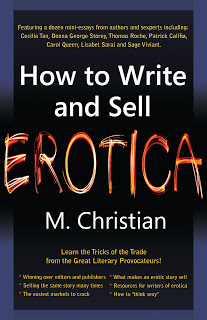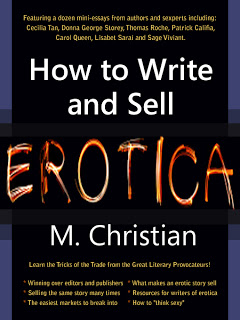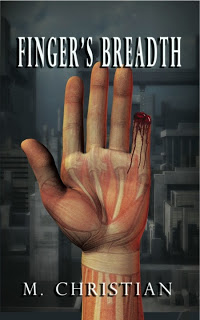Before I begin (yet
again), a bit of disclosure: While
the following has been written in an attempt to be professionally and
personally non-biased I am an Associate Publisher for
Renaissance E Books.
Now, with that out of the way (one more time)…
#
Wanna hear something scary? The build-up might be a bit slow but, believe me, the punch
line is more than worth it.
It begins like this: I’m in the middle of my all-time
favorite part of writing – publicity and marketing (and, yes, that was sarcastic)
– of a new book of mine called Stroke
The Fire: The Best Manlove Fiction Of M.Christian, which
isbasically my own personal best-of-my-very-best
queer erotica, and I’m doing one of those round-robin guest blog things and a question
comes up, “How long did it take you to write the
first draft?”
Well,
without going into the silly details of how I work I answered that, since the
book is made up of stories I’ve written since I first started writing, technically
the book was started in 1994.
Got
that? Well, here it comes: that
basically means that the book was 18 years in the making … now that is a terrifying thought.
What this has
to do with this Streetwalker is that it got me thinking a lot more about
publishers and publishing – and, believe me, after (sigh) 18 years I’ve had
more than my fair share of them.
That, plus the wonderful comments I got on my previous installment,
really got my wheels turning.
One of the big
revelations I had as my wheels cranked was to agree with many of the comments
my first publisher Streetwalker got: a publisher should, naturally, be
considered on the quality of its materials and presence. After all, if a publisher is sloppy
with its contracts and site and so forth that doesn’t bode well.
But I also have
to say that a misspelling here or there shouldn’t necessarily be enough to make
a writer walk away: typos, do, after all, happen to the best of us. Some have suggested doing research on a
publisher before signing and while that may, on the surface, be a good idea I
can’t help but think of all the great books, films, etc., that have gotten
petty, spiteful and – let’s use the word – stupid comments on places like Amazon,
Netflix, and all the rest.
An excellent reason
to use the word stupid, by the way,
is that the world of writing, editing, and publishing is extremely small and it
is far too common for a person to jump from one publisher to another – so
venting bile at one target may, actually, hit a lot of targets … and too
often targets that you might not want to have hit sometime in the future.
So reviews are
not a good judge of a publisher – though I do think chatting with other writers
who may have worked with a publisher is a good idea, if just so you know what
to expect – what really does make a good publisher?
A very common
mistake a lot of writers make is that they feel a publisher should be a
writer’s best friend. That’s not
to say that that a publisher shouldn’t be supportive and enthusiastic about
their authors – that’s actually extremely important – but just that there is a
big difference between being someone being a friend and suggesting that you
swim in shark infested waters. A
good publisher should be encouraging but also have the experience and business
sense to know what is good for their writers – and so be able to tell them
things like: “We love it. We
think it’s wonderfully literary. We
want it. But don’t expect it to
sell a lot of copies.”
I’ve said it
before but those cranking cogs have brought up how important it is that a
publisher, beyond anything else, is a business – and the business, so to
speak, of any business is to make money … not just for the company itself but
to be able to pass along that success to its authors as well as allow it to
grow through things like expanded marketing and advertising. By the same logic, a bad publisher is
one that doesn’t take responsibility for a book’s failure: after 18 years I
still have nightmares about giving a publisher exactly what they wanted – only
to have the book bomb – and my craft being blamed for its failure. A mature and professional publisher
understands that while they may know a lot there is still a universe of things
that can happen – good or bad – to a book, and that tossing away an author only
shows insecurity and irresponsibility.
A good publisher should be there to pat a writer on the back when things
go wrong and tell them to keep working.
That’s not being a best buddy: that’s just understanding that writers
are resources — and that keeping a resource is simply good for business.
The ebook
revolution — no duh — has changed everything, but it’s sad that a lot of
publishers out there haven’t changed the way they operate: they put pressure on
writers like every book could be their last – when the financial risks and
stress are now considerably less; they focus on trying to make one book a best
seller – when a single title is far less important than having a good quantity
(and quality) of books so when one sells they call do; they are pathologically
addicted so social media to the point where the writer ends up spending more
time tweeting than writing – when it’s clear than while social media is
important it is not the only way a book achieves success … and that, once
again, sometimes it all the social media in the world won’t do squat.
A good
publisher understands and encourages their authors to do marketing – but never
at the cost of writing the next book.
Readers, after all, can only buy a book once: so putting a few royalty eggs
in one very small basket makes no sense – far better to put a few royalty eggs
in a lot
of very small baskets.
18 years … it
makes my blood run cold but I hope what’s come out of all this time are some pretty good stories, a few
book books, more than a few scars — and what I hope may be a certain degree of
wisdom.
Part of being a
writer – especially a professional one — is being able to grow and learn. Who knows where you may be in 18 years
but I hope that my reflections here and in other Streetwalkers may make your
own journey a bit smoother.











